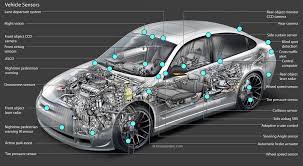WirralCar Repairs
Sensors
- Air-flow Sensor
- Engine Knock Sensor
- Engine Speed Sensor
- Camshaft Position Sensor
- Manifold Absolute Pressure (MAP) Sensor
- Throttle Position Sensor
- Voltage Sensor
- Oxygen Sensor
- NOx Sensor
- Rain Sensor

Common Issues
- Failure to start vehicle
- Spluttering / Rough Engine
- Higher fuel consumption
- Dashboard Warning lights
- Failure of MOT
- Engine cutting out / Limp mode

What is an Automotive Sensor?
An automotive sensor is an electronic device that monitors numerous facets of the car and sends information to the driver or ECU (Electronic Control System). In particular situations, the ECU instantly makes adjustments to the particular part based on the information received from the sensor. The below points cover more information concerning vehicle sensors.
Sensors can check numerous aspects of an automobile, such as its temperature level, coolant system, engine, oil pressure, exhaust degrees, vehicle speed, etc.
The human sense body organs (eyes, nose, mouth, tongue, and hands) are the best examples to recognize the working concept of sensing units. They send signals to the brain, which then makes a decision.
Similarly, automotive sensing units send signals to the ECU to make ideal adjustments or warn the driver.
The sensor is constantly monitoring the various aspects of the automotive from the moment the engine is fired up. In a modern automobile, the sensors are everywhere, from the engine to the least essential electric element of the vehicle.
Functions of Automotive Sensor
The working concept of a sensing unit gives you a broad concept of the features of automotive sensors. Because there are many sensors in an automotive, tracking numerous systems and working of components, the features of auto sensors are broader than you envision.
Nevertheless, the key function of a sensor remains the same, although the aspect is monitoring. It sends info about the system it is tracking to the ECU. The data is passed on via predefined formulas, and based upon that, and the ECU makes adjustments. If the ECU cannot make the necessary changes, it sends a warning to the driver.
Automotive Sensors Types and Their Functions
Car sensors are smart sensors that can be used to control and process oil stress, temperature, emission level, coolant levels, and so on. Various kinds of sensors are used in vehicles, yet recognizing these sensors’ working is necessary. Regarding the function of these sensors, here we have listed some sensors used in vehicles and their functions.
- Air-flow Sensor
- Engine Knock Sensor
- Engine Speed Sensor
- Camshaft Position Sensor
- Manifold Absolute Pressure (MAP) Sensor
- Throttle Position Sensor
- Voltage Sensor
- Oxygen Sensor
- NOx Sensor
- Rain Sensor
Advantages and Disadvantages of Car Sensors
Below are the advantages of car sensors:
- Automotive sensors make driving an easy task.
- The sensor can quickly discover damaged elements in a vehicle.
- Sensors ensure that the engine maintains correctly.
- Sensors also enable automatic control of particular features such as windscreen wipers, headlights, etc.
- The ECU can make exact adjustments with the information obtained from sensor.
- Sensors can likewise pass on cautioning info to the motorist if there is any fault/malfunction with the car and truck’s components.
Below are the dis-advantages of car sensors:
- One major disadvantage of having numerous sensors on board is that they can fail gradually.
- A damaged sensor can cause harm to crucial elements of the vehicle. Obtaining them fixed or replaced can be an expensive event.